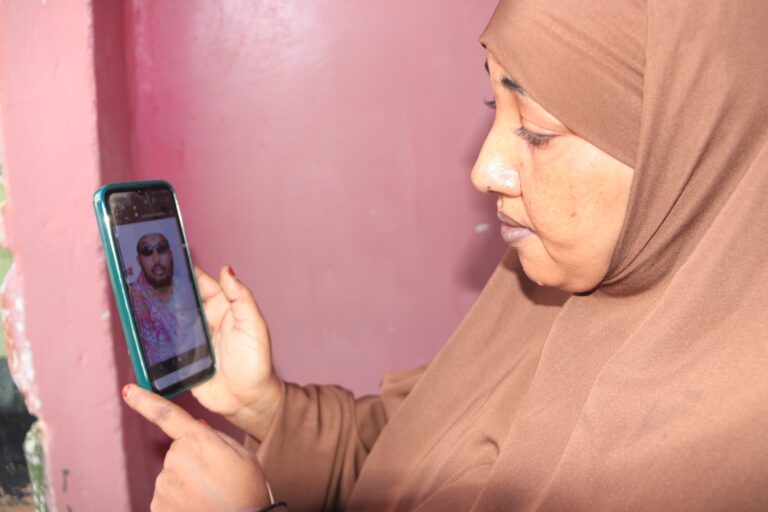ELBUH, Somalia — Saido Ali Abdinur stood at the doorway as her husband got ready — buttoning his shirt, brushing dust from his shoulders. Before leaving, he turned to look at her and smiled — the same quiet gesture he gave her every time he walked out the door.
He was heading to visit his second wife in Badhan, then on to mediate a land dispute between two villages — work he had done for years, always in service of peace. He kissed her forehead, stepped outside, and drove off alone.
She never imagined it would be the last time she saw him.
“They didn’t just take my husband,” she later said softly. “They destroyed him.”
Three U.S. missiles turned his vehicle into fire and fragments. When villagers reached the remote stretch of road near Ji’anyo, they found only twisted metal, scorched earth — and the shredded remains of a man known across northern Somalia for one thing: peace.
A Grief Too Heavy for Words
Since that day, Saido’s world has gone quiet. She barely speaks. She barely eats. Most hours of the day, she sits still, holding her phone in her lap — a photo of her husband on the screen. She opens it again and again, as if by force of memory, she might undo what has been done.
“She scrolls to his face,” said her brother-in-law, Ali Abdullahi Abdi. “And whispers: Why him? When will someone answer for this?”
She buried only what little was left — a few pieces of flesh. There was no body. No goodbye. No justice.
“She is in pain no one can imagine,” Ali said. “This isn’t just grief. It’s a wound that won’t close
— because no one will take responsibility.”
He Was Going to Help
On that day, Caaqil Omar Abdullahi Abdi was doing what he had done all his life: resolving conflict. After his stop in Badhan, he planned to mediate a dispute — the kind of dispute that, left unresolved, could turn violent.
“He spent his life solving other people’s problems,” said Mayor Mohamed Ahmed Salad of Elbuh. “This time, he didn’t make it.”
There were no weapons in the car. No one else in the vehicle. Just an elder driving alone, fulfilling his duty as a man of peace — and unknowingly heading into a strike that would claim his life.
Strikes That Kill More Than Targets
U.S. drone strikes in Somalia have repeatedly killed civilians mistaken for militants, according to rights groups — with victims’ families left to grieve in silence, without justice, accountability, or explanation.
In one 2019 case, Amnesty International confirmed a U.S. strike killed three Somali farmers driving home from their fields — men wrongly identified by AFRICOM as al-Shabab fighters, without evidence.
Despite mounting evidence of civilian harm, rights groups say U.S. officials rarely investigate thoroughly or offer apologies — leaving Somali families with only silence, broken lives, and unanswered questions.
Amnesty and Human Rights Watch accuse AFRICOM of consistently denying civilian deaths unless overwhelming evidence surfaces, allowing repeated strikes to go unchallenged and innocent victims to be labeled as terrorists.
“Behind every denial, there is a Somali family left with ashes and no answers,” said Abdullahi Hassan, Amnesty International’s Somalia Researcher. “The human cost of these drone strikes remains dangerously hidden.”
The Spot Where He Died Is Now Sacred
The family chose to leave the wrecked vehicle where it fell, in the bush outside Ji’anyo. Around it, they built a stone memorial, marked by grief and the defiant memory of a life wrongly taken.
“This is where they ended him,” said his elder brother, Ali Abdullahi Abdi. “We will not hide it. We want the world to see what was done.”
Visitors now come from across the region. They pray. They stand in silence beside the blackened metal that once carried a man who carried communities.

“Here died a man of peace. Killed by mistake.” Even Al-Shabab denied being membership, a family member said.
The U.S. Africa Command (AFRICOM) said it conducted a drone strike on September 13 in Somalia’s Sanaag region, targeting a weapons dealer linked to al-Shabab. The date and location match precisely where Omar’s car was destroyed by three missiles.
But in a rare public statement, al-Shabab itself denied any connection to the slain elder, accusing the U.S. of killing civilians and covering up the bloodshed.
Rights monitors have long warned that poor intelligence, misidentification, and rushed strikes have led to civilian casualties being quietly buried, both literally and politically.
“This happens too often,” said Ali Hussein, a human rights advocate in Puntland. “The victims have names, families, lives. But they are never more than a line in a report — if that.”
Trust, Broken
In Sanaag, the strike has shattered more than a family — it has shaken public faith in the foreign forces meant to fight terrorism.
“If even the peacemakers are targeted,” asked elder Mohamed Hassan, “who will have the courage to stand up to the real threats?”
Protests and emergency clan meetings have followed. Elders warn that the death of a trusted mediator may now embolden extremists, who thrive in the absence of unity and trust.
No Revenge — Only the Truth
Despite their anguish, Omar’s family says they do not seek vengeance.
“We are not asking for blood,” said Abdi. “We are asking for truth. For his name to be cleared. For someone to say: this was wrong.”
Every day, they return to the memorial. A place where memory rises from ashes. Where a photograph rests against wreckage. Where silence says what words cannot.
“They thought they were silencing one man,” Ali said. “But they awakened an entire region.”
Reporting by Abdirisak Mohamud Turyare from Elbuh, Somalia.

